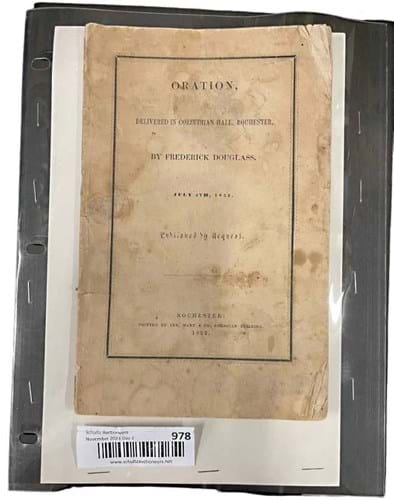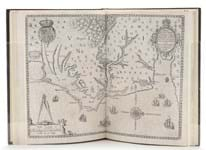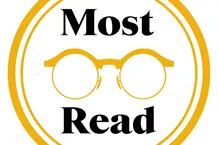
Oration Delivered in Corinthian Hall, Rochester by Frederick Douglass on July 5, 1852, $69,000 (£54,000) at Schultz.
A contemporary printing of one of the most famous speeches given by abolitionist Frederick Douglass (1818-95) sold for a multi-estimate sum at Schultz Auctioneers (20% buyer’s premium) in Clarence, New York, on November 25.
The copy of the 10,000-word oration given at Corinthian Hall, Rochester, New York, in 1852 was issued shortly afterwards by local printer Lee Mann & Co.
Estimated at up to $3500, it hammered for $69,000 (£54,800).
Douglass had been invited to address the citizens of his hometown on July 5 by local women’s abolitionist group, the Rochester Anti-Slavery Sewing Society.
Issued the day after the nation celebrated the 76th anniversary of the signing of the Declaration of Independence, he used the occasion to focus on the continuing enslavement of millions.
“What to the Slave is Your Fourth of July?” he asked. “The rich inheritance of justice, liberty, prosperity and independence, bequeathed by your fathers, is shared by you, not by me. The sunlight that brought life and healing to you, has brought stripes and death to me.”
His polemic continued. “I do not hesitate to declare, with all my soul, that the character and conduct of this nation never looked blacker to me than on this 4th of July! Whether we turn to the declarations of the past, or to the professions of the present, the conduct of the nation seems equally hideous and revolting. America is false to the past, false to the present, and solemnly binds herself to be false to the future.”
After giving the speech, some 700 copies of this pamphlet titled Oration Delivered in Corinthian Hall, Rochester by Frederick Douglass were sold to members of the audience.
An advertisement in the North Star later in the month read: ‘The 4th of July Address, delivered in Corinthian Hall, by Frederick Douglass, is published on good paper, and makes a neat pamphlet of forty pages. The ‘Address’ may be had at this office, price ten cents, a single copy, or six dollars per hundred.’
Rare at auction
The pamphlet survives in a number of institutional collections but is rare at auction. A stamp to one of the pages of the Schultz copy suggested it was formerly part of the collection of the local historical society, the Clarence Historical Museum. It was intact but some of the pages were soiled.













